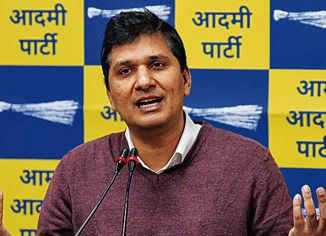
The author wrote Zindaginama in reaction to the Partition, situating her novel in the early years of the 20th century
Charu Soni
Some books are known for the stories they tell, some by the controversies that surround them. Krishna Sobti’s masterpiece, Zindaginama, is famous for both. The first English version of the book, invites new readers to access the thoughts and ideas of one of India’s most sensitive, alert and observant minds.
Sobti wrote Zindaginama in reaction to the Partition, situating her novel in the early years of the 20th century.
The trigger was a short-story, Sikka Badal Gaya, an emotional tale based on the travails of Sobti’s grandmother, who trudged for three months with a kafila to Amritsar during the tragic 1947 migration. In the story, the Hindu protagonist is rescued by a Muslim police officer, a family friend. Sikka Badal Gaya was a milestone in Sobti’s life as it appeared in a literary magazine edited by the giant of modern Hindi literature Ajneya (Sachchidananda Hirananda Vatsyayan).
In 1959, an Allahabad publishing house ran a vengeful red pencil through the proofs of her first draft without her consent. Disappointed with the overzealous editing, Sobti bought the entire printed stock without releasing it into the market. She laboured on the draft for more than two decades and came out with Zindaginama in 1979. It was published by the well-known Rajkamal Prakashan and selected a year later for the Sahitya Akademi Award.
Zindaginama is a complex book, both in structure and linguistic rendition. The story is told through a farming community and the social, caste structure, languages and customs that defined the time (1900-1916).
It begins with the memory of the second Anglo Sikh war which led to annexation of Punjab (the fictional village is situated not far from the battlefield), and moves through peasant recruitment into the British Army, the building of canal colonies, the protests against the Land Alienation Act, the rise of ‘inquilabi’ sentiment, the Ghadar wave and the discontent that led to the Khilafat Movement in 1919.
Now, a few words on Sobti crossing swords with the writer-poet Amrita Pritam whose Hardutt Ka Zindaginama appeared four years after Sobti’s Zindaginama was published. The feud started with Sobti filing for damages on charges of copyright infringement. The writer fraternity was split between rooting for Sobti and Pritam. The case, in a nutshell, revolved around Pritam’s use of the word Zindaginama in promoting her book. Sobti maintained that she had no problems with the title of Pritam’s book. What annoyed her was Pritam marketing the book as Zindaginama —a copyright she was ‘entitled’ to.
One of the judges who sat on the case, Justice DR Khanna, noted that the copy of the title page of Pritam’s Hardutt ka Zindaginama featured only the word ‘zindaginama’ and the advertisement for the book in an Urdu literary magazine also carried only the word ‘zindaginama’.
Pritam won the court case in 2011, six years after her own death.
The battle also drew in Khushwant Singh who maintained that the word ‘zindaginama’, as a composite word circulated in a culture, cannot be copyrighted. He produced books including his own two-volume work on the history of Sikhs that included a reference to a Guru Gobind Singh biography, incidentally, called, Zindaginama.
After case files were lost, the court relied on Khushwant Singh’s deposition and ruled in Pritam’s favour. Sobti says she would have taken the case all the way to the Supreme Court if it wasn’t for Pritam’s untimely death and 27 years it took for the Court to adjudicate.
There is a postscript: In 2011, then Delhi Chief Minister Sheila Dixit attempted a patch up between Khushwant Singh and Sobti. When the two met, the Sardar is said to have exclaimed, “Tussi abhi bhi naraaz ho? (Are you still angry with me?).” Sobti apparently replied with the stately grace she is known for, “No sir, I am in minority of one.”
With the book now available in English, in a first of its kind translation, readers can make up their own mind about the author and her work. In the end — to borrow Sobti’s words — life lies in the details, in the ‘History that is not, and History that is.’



























